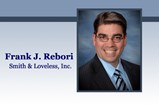WWEMA Window: Beware Of 'Taxmageddon'

By Frank J. Rebori, President, Smith & Loveless, Inc.
Treasurer, Water and Wastewater Equipment Manufacturers Association (WWEMA)
Uncertainty is never good for any market or economy, and the water and wastewater industry is no exception. The tenuous status of the current U.S. tax rates and whether they will be allowed to expire at the end of this calendar year should be sounding alarms throughout our industry. Unless the President and Congress enact tax extender legislation to maintain the current rates, we will be facing as a nation what many people are calling “Taxmageddon” and its uncertain fallout.
If not extended, the current tax rates will increase as follows:
- the highest individual tax rate will increase to nearly 40%
![]()
- the tax rates on dividends will nearly triple from 15% to 43.3%
- the tax rates on capital gains will increase from 15% to nearly 24%
- the estate tax will increase from 35% to 55% and the lifetime exemption will drop from $5,000,000 to $1,000,000.
Some incorrectly assume that these tax increases affect only “the rich” or big corporations. Indeed, the increase in dividends and capital gains affects anyone who has a 401k, which includes more than 60 million Americans. Many people have estates that easily top more than $1,000,000 when considering the value of a home and retirement accounts.
Likewise, the many companies in our industry such as the installing contractors, engineering firms, and equipment manufacturers that operate as pass-through entities (i.e. LLC, LLP, S-Corp) will feel the effects. Business income is taxed not at the corporate level, but instead flows through to the individual owners and is taxed at the individual rates.
It is common to have projects in our industry with a life cycle of 2 to 3 years or more, from inception and budgeting, to design and manufacture, to installation and start up. Planning operating budgets from year to year, therefore, proves difficult from not knowing how much revenue will be left for operation and expansion. Engineering firms, installing contractors, and manufacturers may try to account for this uncertainty by increasing their estimates on projects or by deferring to add much needed personnel. The end result is that public and private water and wastewater projects will see higher costs and slower completions — all to the detriment of the municipal and private end users. This, of course, eventually affects the citizens in these regions who benefit from having good and sound water and wastewater infrastructure.
Moreover, the research & development tax credit that expired at the end of 2011 has yet to be extended for 2012, even though we are three quarters of the way through the year. Congress traditionally has extended the R&D credit retroactively to January 1. But, with the upcoming election, that is not guaranteed and thus there is more uncertainty. The R&D credit is vital for U.S. water and wastewater equipment manufacturers, as it assists us in conducting research and creating new environmental products, which in the end help all of us.
Death and taxes are certain. However, when we will die and what the tax rates will be when that event occurs is an uncertainty that is not helping our economy recover. While our presidential candidates each tell us that he has the right plan to improve our economy, the best thing both candidates could do would be to actively support legislation that would maintain the current tax rates…and then simply get out of the way.
(NOTE: The views and opinions expressed in Water Online guest columns are those of the authors and do not necessarily reflect the opinions of Water Online, the editorial staff, or VertMarkets, Inc.)

